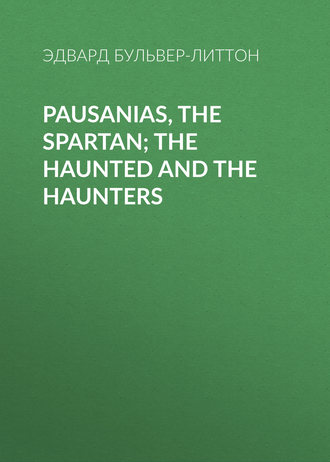
Эдвард Бульвер-Литтон
Pausanias, the Spartan; The Haunted and the Haunters
"Therefore," said he, "while the Athenians will occupy this wing, I wish you to divide yourselves; the Lacedaemonian ships will take the way the Athenians abandon, but the Corinthian triremes will place themselves between the ships of the Islands and the Athenians. I shall give further orders towards distributing the Ionian navy. And thus I trust either all chance of a mutiny is cut off, or it will be put down at the first outbreak. Now give orders to your men to take the places thus assigned to you. And having gratified the vanity of our friends the Athenians by their holiday evolutions, I shall send to thank and release them from the fatigue so gracefully borne."
All those with whom he here conferred, and who had no love for Athens or Ionia, readily fell into the plan suggested. Pausanias then despatched a Laconian vessel to the Athenian Admiral, with complimentary messages and orders to cease the manoeuvres, and then heading the rest of the Laconian contingent, made slow and stately way towards the station deserted by the Athenians. But pausing once more before the vessels of the Isles, he despatched orders to their several commanders, which had the effect of dividing their array, and placing between them the powerful Corinthian service. In the orders of the vessels he forwarded for this change, he took especial care to dislocate the dangerous contiguity of the Samian and Chian triremes.
The sun was declining towards the west when Pausanias had marshalled the vessels he headed, at their new stations, and the Athenian ships were already anchored close and secured. But there was an evident commotion in that part of the fleet to which the Corinthian galleys had sailed. The Ionians had received with indignant murmurs the command which divided their strength. Under various pretexts each vessel delayed to move; and when the Corinthian ships came to take a vacant space, they found a formidable array,—the soldiers on the platforms armed to the teeth. The confusion was visible to the Spartan chief; the loud hubbub almost reached to his ears. He hastened towards the place; but anxious to continue the gracious part he had so unwontedly played that day, he cleared his decks of their formidable hoplites, lest he might seem to meet menace by menace, and drafting them into other vessels, and accompanied only by his personal serving-men and rowers, he put forth alone, the gilded shield and the red banner still displayed at his stern.
But as he was thus conspicuous and solitary, and midway in the space left between the Laconian and Ionian galleys, suddenly two ships from the latter darted forth, passed through the centre of the Corinthian contingent, and steered with the force of all their rowers, right towards the Spartan's ship.
"Surely," said Pausanias, "that is the Chian's vessel. I recognize the vine tree and the image of the Bromian god; and surely that other one is the Chimera under Uliades, the Samian. They come hither, the Ionian with them, to harangue against obedience to my orders."
"They come hither to assault us," exclaimed Erasinidas; "their beaks are right upon us."
He had scarcely spoken, when the Chian's brass prow smote the gilded shield, and rent the red banner from its staff. At the same time, the Chimera, under Uliades, struck the right side of the Spartan ship, and with both strokes the stout vessel reeled and dived. "Know, Spartan," cried Antagoras, from the platform in the midst of his soldiers, "that we Ionians hold together. He who would separate, means to conquer, us. We disown thy hegemony. If ye would seek us, we are with the Athenians."
With that the two vessels, having performed their insolent and daring feat, veered and shot off with the same rapidity with which they had come to the assault; and as they did so, hoisted the Athenian ensign over their own national standards. The instant that signal was given, from the other Ionian vessels, which had been evidently awaiting it, there came a simultaneous shout; and all, vacating their place and either gliding through or wheeling round the Corinthian galleys, steered towards the Athenian fleet.
The trireme of Pausanias, meanwhile, sorely damaged, part of its side rent away, and the water rushing in, swayed and struggled alone in great peril of sinking.
Instead of pursuing the Ionians, the Corinthian galleys made at once to the aid of the insulted commander.
"Oh," cried Pausanias, in powerless wrath, "Oh, the accursed element! Oh that mine enemies had attacked me on the land!"
"How are we to act?" said Aristides.
"We are citizens of a Republic, in which the majority govern," answered Cimon. "And the majority here tell us how we are to act. Hark to the shouts of our men, as they are opening way for their kinsmen of the Isles."
The sun sank, and with it sank the Spartan maritime ascendancy over Hellas. And from that hour in which the Samian and the Chian insulted the galley of Pausanias, if we accord weight to the authority on which Plutarch must have based his tale, commenced the brief and glorious sovereignty of Athens. Commence when and how it might, it was an epoch most signal in the records of the ancient world for its results upon a civilization to which as yet human foresight can predict no end.
END OF VOLUME I
VOLUME II
BOOK IV
CHAPTER I
We pass from Byzantium, we are in Sparta. In the Archeion, or office of the Ephoralty, sate five men, all somewhat advanced in years. These constituted that stern and terrible authority which had gradually, and from unknown beginnings,29 assumed a kind of tyranny over the descendants of Hercules themselves. They were the representatives of the Spartan people, elected without reference to rank or wealth,30 and possessing jurisdiction not only over the Helots and Laconians, but over most of the magistrates. They could suspend or terminate any office, they could accuse the kings and bring them before a court in which they themselves were judges upon trial of life and death. They exercised control over the armies and the embassies sent abroad; and the king, at the head of his forces, was still bound to receive his instructions from this Council of Five. Their duty, in fact, was to act as a check upon the kings, and they were the representatives of that Nobility which embraced the whole Spartan people, in contradistinction to the Laconians and Helots.
The conference in which they were engaged seemed to rivet their most earnest attention. And as the presiding Ephor continued the observations he addressed to them, the rest listened with profound and almost breathless silence.
The speaker, named Periclides, was older than the others. His frame, still upright and, sinewy, was yet lean almost to emaciation, his face sharp, and his dark eyes gleamed with a cunning and sinister light under his grey brows.
"If," said he, "we are to believe these Ionians, Pausanias meditates some deadly injury to Greece. As for the complaints of his arrogance, they are to be received with due caution. Our Spartans, accustomed to the peculiar discipline of the Laws of Aegimius, rarely suit the humours of Ionians and innovators. The question to consider is not whether he has been too imperious towards Ionians who were but the other day subjected to the Mede, but whether he can make the command he received from Sparta menacing to Sparta herself. We lend him iron, he hath holpen himself to gold."
"Besides the booty at Plataea, they say that he has amassed much plunder at Byzantium," said Zeuxidamus, one of the Ephors, after a pause.
Periclides looked hard at the speaker, and the two men exchanged a significant glance.
"For my part," said a third, a man of a severe but noble countenance, the father of Lysander, and, what was not usual with the Ephors, belonging to one of the highest families of Sparta, "I have always held that Sparta should limit its policy to self-defence; that, since the Persian invasion is over, we have no business with Byzantium. Let the busy Athenians obtain if they will the empire of the sea. The sea is no province of ours. All intercourse with foreigners, Asiatics and Ionians, enervates our men and corrupts our generals. Recall Pausanias—recall our Spartans. I have said."
"Recall Pausanias first," said Periclides, "and we shall then hear the truth, and decide what is best to be done."
"If he has medised, if he has conspired against Greece, let us accuse him to the death," said Agesilaus, Lysander's father.
"We may accuse, but it rests not with us to sentence," said Periclides, disapprovingly.
"And," said a fourth Ephor, with a visible shudder, "what Spartan dare counsel sentence of death to the descendant of the Gods?"
"I dare," replied Agesilaus, "but provided only that the descendant of the Gods had counselled death to Greece. And for that reason, I say that I would not, without evidence the clearest, even harbour the thought that a Heracleid could meditate treason to his country."
Periclides felt the reproof and bit his lips.
"Besides," observed Zeuxidamus, "fines enrich the State."
Periclides nodded approvingly.
An expression of lofty contempt passed over the brow and lip of Agesilaus. But with national self-command, he replied gravely, and with equal laconic brevity, "If Pausanias hath committed a trivial error that a fine can expiate, so be it. But talk not of fines till ye acquit him of all treasonable connivance with the Mede."
At that moment an officer entered on the conclave, and approaching the presiding Ephor, whispered in his ear.
"This is well," exclaimed Periclides aloud. "A messenger from Pausanias himself. Your son Lysander has just arrived from Byzantium."
"My son!" exclaimed Agesilaus eagerly, and then checking himself, added calmly, "That is a sign no danger to Sparta threatened Byzantium when he left."
"Let him be admitted," said Periclides.
Lysander entered; and pausing at a little distance from the council board, inclined his head submissively to the Ephors; save a rapid interchange of glances, no separate greeting took place between son and father.
"Thou art welcome," said Periclides. "Thou hast done thy duty since thou hast left the city. Virgins will praise thee as the brave man; age, more sober, is contented to say thou hast upheld the Spartan name. And thy father without shame may take thy hand."
A warm flush spread over the young man's face. He stepped forward with a quick step, his eyes beaming with joy. Calm and stately, his father rose, clasped the extended hand, then releasing his own placed it an instant on his son's bended head, and reseated himself in silence.
"Thou camest straight from Pausanias?" said Periclides.
Lysander drew from his vest the despatch entrusted to him, and gave it to the presiding Ephor. Periclides half rose as if to take with more respect what had come from the hand of the son of Hercules.
"Withdraw, Lysander," he said, "and wait without while we deliberate on the contents herein."
Lysander obeyed, and returned to the outer chamber.
Here he was instantly surrounded by eager, though not noisy groups. Some in that chamber were waiting on business connected with the civil jurisdiction of the Ephors. Some had gained admittance for the purpose of greeting their brave countryman, and hearing news of the distant camp from one who had so lately quitted the great Pausanias. For men could talk without restraint of their General, though it was but with reserve and indirectly that they slid in some furtive question as to the health and safety of a brother or a son.
"My heart warms to be amongst ye again," said the simple Spartan youth. "As I came thro' the defiles from the sea-coast, and saw on the height the gleam from the old Temple of Pallas Chalcioecus, I said to myself, 'Blessed be the Gods that ordained me to live with Spartans or die with Sparta!'"
"Thou wilt see how much we shall make of thee, Lysander," cried a Spartan youth a little younger than himself, one of the superior tribe of the Hylleans. "We have heard of thee at Plataea. It is said that had Pausanias not been there thou wouldst have been called the bravest Greek in the armament."
"Hush," said Lysander, "thy few years excuse thee, young friend. Save our General, we were all equals in the day of battle."
"So thinks not my sister Percalus," whispered the youth archly; "scold her as thou dost me, if thou dare."
Lysander coloured, and replied in a voice that slightly trembled, "I cannot hope that thy sister interests herself in me. Nay, when I left Sparta, I thought—" He checked himself.
"Thought what?"
"That among those who remained behind Percalus might find her betrothed long before I returned."
"Among those who remained behind! Percalus! How meanly thou must think of her."
Before Lysander could utter the eager assurance that he was very far from thinking meanly of Percalus, the other bystanders, impatient at this whispered colloquy, seized his attention with a volley of questions, to which he gave but curt and not very relevant answers, so much had the lad's few sentences disturbed the calm tenor of his existing self-possession. Nor did he quite regain his presence of mind until he was once more summoned into the presence of the Ephors.
CHAPTER II
The communication of Pausanias had caused an animated discussion in the Council, and led to a strong division of opinion. But the faces of the Ephors, rigid and composed, revealed nothing to guide the sagacity of Lysander, as he re-entered the chamber. He himself, by a strong effort, had recovered the disturbance into which the words of the boy had thrown his mind, and he stood before the Ephors intent upon the object of defending the name, and fulfilling the commands of his chief. So reverent and grateful was the love that he bore to Pausanias, that he scarcely permitted himself even to blame the deviations from Spartan austerity which he secretly mourned in his mind; and as to the grave guilt of treason to the Hellenic cause, he had never suffered the suspicion of it to rest upon an intellect that only failed to be penetrating, where its sight was limited by discipline and affection. He felt that Pausanias had entrusted to him his defence, and though he would fain, in his secret heart, have beheld the Regent once more in Sparta, yet he well knew that it was the duty of obedience and friendship to plead against the sentence of recall which was so dreaded by his chief.
With all his thoughts collected towards that end, he stood before the Ephors, modest in demeanour, vigilant in purpose.
"Lysander," said Periclides, after a short pause, "we know thy affection to the Regent, thy chosen friend; but we know also thy affection for thy native Sparta; where the two may come into conflict, it is, and it must be, thy country which will claim the preference. We charge thee, by virtue of our high powers and authority, to speak the truth on the questions we shall address to thee, without fear or favour."
Lysander bowed his head. "I am in presence of Sparta my mother and Agesilaus my father. They know that I was not reared to lie to either."
"Thou say'st well. Now answer. Is it true that Pausanias wears the robes of the Mede?"
"It is true."
"And has he stated to thee his reasons?
"Not only to me, but to others."
"What are they?"
"That in the mixed and half medised population of Byzantium, splendour of attire has become so associated with the notion of sovereign power, that the Eastern dress and attributes of pomp are essential to authority; and that men bow before his tiara, who might rebel against the helm and the horsehair. Outward signs have a value, O Ephors, according to the notions men are brought up to attach to them."
"Good," said one of the Ephors. "There is in this departure from our habits, be it right or wrong, no sign then of connivance with the Barbarian."
"Connivance is a thing secret and concealed, and shuns all outward signs."
"But," said Periclides, "what say the other Spartan Captains to this vain fashion, which savours not of the Laws of Aegimius?"
"The first law of Aegimius commands us to fight and to die for the king or the chief who has kingly sway. The Ephors may blame, but the soldier must not question."
"Thou speakest boldly for so young a man," said Periclides harshly.
"I was commanded to speak the truth."
"Has Pausanias entrusted the command of Byzantium to Gongylus the Eretrian, who already holds four provinces under Xerxes?"
"He has done so."
"Know you the reason for that selection?"
"Pausanias says that the Eretrian could not more show his faith to Hellas, than by resigning Eastern satrapies so vast."
"Has he resigned them?"
"I know not; but I presume that when the Persian king knows that the Eretrian is leagued against him with the other Captains of Hellas, he will assign the Satrapies to another."
"And is it true that the Persian prisoners, Ariamanes and Datis, have escaped from the custody of Gongylus?"
"It is true. The charge against Gongylus for that error was heard in a council of confederate captains, and no proof against him was brought forward. Cimon was entrusted with the pursuit of the prisoners. Pausanias himself sent forth fifty scouts on Thessalian horses. The prisoners were not discovered."
"Is it true," said Zeuxidamus, "that Pausanias has amassed much plunder at Byzantium?"
"What he has won as a conqueror was assigned to him by common voice, but he has spent largely out of his own resources in securing the Greek sway at Byzantium."
There was a silence. None liked to question the young soldier farther; none liked to put the direct question, whether or not the Ionian Ambassador could have cause for suspecting the descendant of Hercules of harm against the Greeks. At length Agesilaus said:
"I demand the word, and I claim the right to speak plainly. My son is young, but he is of the blood of Hyllus.
"Son—Pausanias is dear to thee. Man soon dies: man's name lives for ever. Dear to thee if Pausanias is, dearer must be his name. In brief, the Ionian Ambassadors complain of his arrogance towards the Confederates; they demand his recall. Cimon has addressed a private letter to the Spartan host, with whom he lodged here, intimating that it may be best for the honour of Pausanias, and for our weight with the allies, to hearken to the Ionian Embassy. It is a grave question, therefore, whether we should recall the Regent or refuse to hear these charges. Thou art fresh from Byzantium; thou must know more of this matter than we. Loose thy tongue, put aside equivocation. Say thy mind, it is for us to decide afterwards what is our duty to the State."
"I thank thee, my father," said Lysander, colouring deeply at a compliment paid rarely to one so young, "and thus I answer thee:
"Pausanias, in seeking to enforce discipline and preserve the Spartan supremacy, was at first somewhat harsh and severe to these Ionians, who had indeed but lately emancipated themselves from the Persian yoke, and who were little accustomed to steady rule. But of late he has been affable and courteous, and no complaint was urged against him for austerity at the time when this embassy was sent to you. Wherefore was it then sent? Partly, it maybe, from motives of private hate, not public zeal, out partly because the Ionian race sees with reluctance and jealousy the Hegemony of Sparta. I would speak plainly. It is not for me to say whether ye will or not that Sparta should retain the maritime supremacy of Hellas, but if ye do will it, ye will not recall Pausanias. No other than the Conqueror of Plataea has a chance of maintaining that authority. Eager would the Ionians be upon any pretext, false or frivolous, to rid themselves of Pausanias. Artfully willing would be the Athenians in especial that ye listened to such pretexts; for, Pausanias gone, Athens remains and rules. On what belongs to the policy of the State it becomes not me to proffer a word, O Ephors. In what I have said I speak what the whole armament thinks and murmurs. But this I may say as soldier to whom the honour of his chief is dear.—The recall of Pausanias may or may not be wise as a public act, but it will be regarded throughout all Hellas as a personal affront to your general; it will lower the royalty of Sparta, it will be an insult to the blood of Hercules. Forgive me, O venerable magistrates. I have fought by the side of Pausanias, and I cannot dare to think that the great Conqueror of Plataea, the man who saved Hellas from the Mede, the man who raised Sparta on that day to a renown which penetrated the farthest corners of the East, will receive from you other return than fame and glory. And fame and glory will surely make that proud spirit doubly Spartan."
Lysander paused, breathing hard and colouring deeply—annoyed with himself for a speech of which both the length and the audacity were much more Ionian than Spartan.
The Ephors looked at each other, and there was again silence.
"Son of Agesilaus," said Periclides, "thou hast proved thy Lacedaemonian virtues too well, and too high and general is thy repute amongst our army, as it is borne to our ears, for us to doubt thy purity and patriotism; otherwise, we might fear that whilst thou speakest in some contempt of Ionian wolves, thou hadst learned the arts of Ionian Agoras. But enough: thou art dismissed. Go to thy home; glad the eyes of thy mother; enjoy the honours thou wilt find awaiting thee amongst thy coevals. Thou wilt learn later whether thou return to Byzantium, or whether a better field for thy valour may not be found in the nearer war with which Arcadia threatens us."
As soon as Lysander left the chamber,
Agesilaus spoke:—
"Ye will pardon me, Ephors, if I bade my son speak thus boldly. I need not say I am no vain, foolish father, desiring to raise the youth above his years. But making allowance for his partiality to the Regent, ye will grant that he is a fair specimen of our young soldiery. Probably, as he speaks, so will our young men think. To recall Pausanias is to disgrace our general. Ye have my mind. If the Regent be guilty of the darker charges insinuated—correspondence with the Persian against Greece—I know but one sentence for him—Death. And it is because I would have ye consider well how dread is such a charge, and how awful such a sentence, that I entreat ye not lightly to entertain the one unless ye are prepared to meditate the other. As for the maritime supremacy of Sparta, I hold, as I have held before, that it is not within our councils to strive for it; it must pass from us. We may surrender it later with dignity; if we recall our general on such complaints, we lose it with humiliation."
"I agree with Agesilaus," said another, "Pausanias is an Heracleid; my vote shall not insult him."
"I agree too with Agesilaus," said a third Ephor; "not because Pausanias is the Heracleid, but because he is the victorious general who demands gratitude and respect from every true Spartan."
"Be it so," said Periclides, who, seeing himself thus outvoted in the council, covered his disappointment with the self-control habitual to his race. "But be we in no hurry to give these Ionian legates their answer to-day. We must deliberate well how to send such a reply as may be most conciliating and prudent. And for the next few days we have an excuse for delay in the religious ceremonials due to the venerable Divinity of Fear, which commence to-morrow. Pass we to the other business before us; there are many whom we have kept waiting. Agesilaus, thou art excused from the public table to-day if thou wouldst sup with thy brave son at home."
"Nay," said Agesilaus, "my son will go to his pheidition and I to mine—as I did on the day when I lost my first-born."







